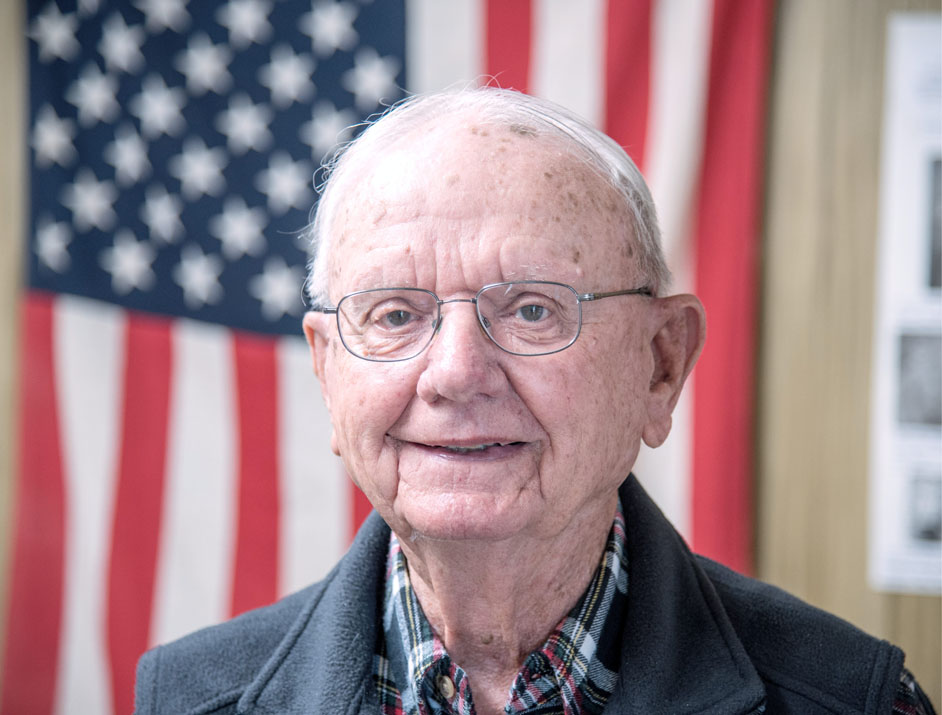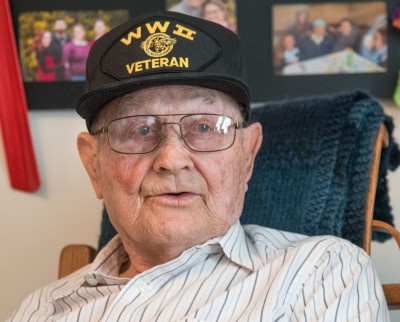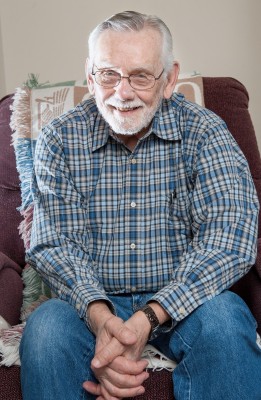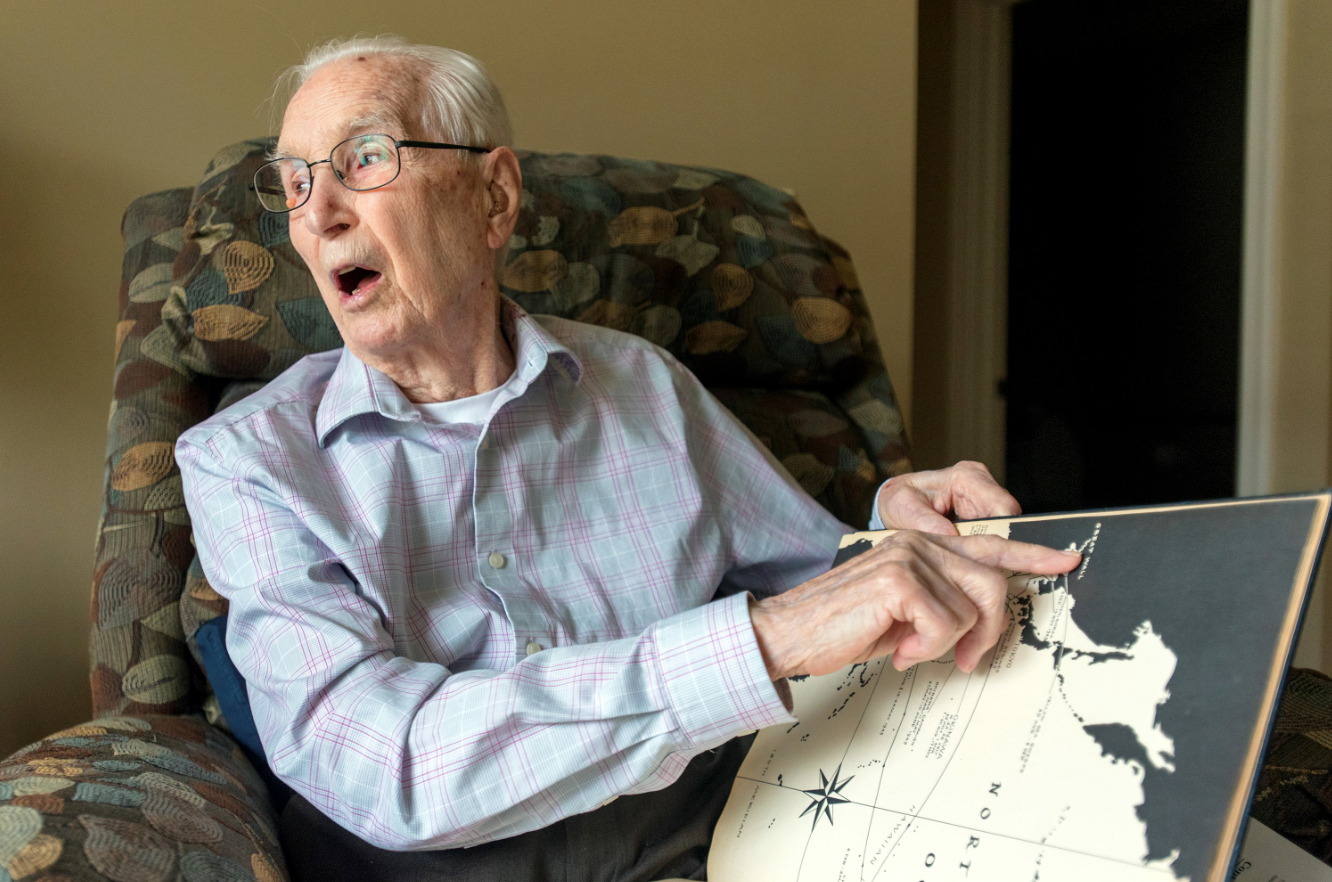Bill Kirby
By Paul Wood

Photo By Rick Danzl/The News-Gazette
TOLONO — Bill Kirby picked up downed aviators from the sea during World War II, saving Americans, British and even Germans.
The former Tolono mayor was a medical administrator in the Army Air Forces, entering the service as a private and leaving as a captain.
He helped fight tuberculosis while stationed in London, where “buzz bombs” demolished buildings a block or two away.
Growing up in Buffalo, which is near Springfield, Kirby “couldn’t stand bean dust” and wanted desperately to be something other than a farmer.
But it was the Depression, and his mother told him college was not a financial possibility.
Then his father found a job for him in the tightest of times in the 1930s. For $400, Kirby would mow miles of right of way behind a horse for the Wabash Railroad.
And that was enough to get him through two years of school at Blackburn College in Carlinville. He then transferred to the University of Illinois for the last two years.
He was a senior in Urbana on Dec. 7, 1941, when he heard that the Japanese had bombed Pearl Harbor and other Pacific war targets.
Allowed to finish his senior year, Kirby was called for a physical, where an officer asked him about his interests.
Kirby said he wanted to serve in the air. But the Army wanted him on the land.
Because he’d worked as a clerk in the UI Library, the Army considered him meant to be a clerk. But because he had a college degree, he was also eligible for Officer Candidate School.
Kirby was a “90-day wonder,” turned into a second lieutenant with all deliberate speed. Then they put him in command of a medical detachment.
On a base in Tennessee and newly married, Kirby was helped by another officer with whom he played bridge.
Twice Kirby was ordered overseas, and twice his friend got him out of it so he would keep his bridge partner. On the third time, he was sent to the European Theater.
Kirby got on a troop ship — a Liberty Ship, an “emergency” type of cargo ship nicknamed “the ugly duckling.”
The North Atlantic was a nasty crossing.
“It tossed us up in the air, then dropped us down,” he recalls. “That’s where I learned to pray.”
The ship took him to Southampton, England, which Kirby said was “pretty much taken over by Americans.”
His most dramatic detail was as a medical administration officer on a pontoon plane that traveled back and forth over the English Channel, picking up survivors.
“The waves of bombers went out every morning in perfect formation. They came back in partial formation, or one by one, sometimes on fire,” he said.
The pontoon plane would land and grab survivors, sometimes German fighter pilots who’d been chasing down the wounded bombers.
“We fished them all out,” he says. “The Germans got put away.”
On D-Day, he was serving in London under Air Force Surgeon General Malcolm Grow, with duties including taking care of tuberculosis cases, which were common then. He remembers being in Piccadilly Circus.
Celebration of the victorious Allied landing was somewhat muted about a week later by V-1 “buzz bombs” the Germans dropped on the metropolis.
“You could hear them coming,” he says. “But you didn’t hear the V-2s until they hit.”
As 1944 neared its end, massive reinforcements were needed against the Battle of the Bulge German counter-offensive. He barely escaped being sent into a unit that had high casualties.
In spring 1945, it was clear Germany would lose the war, and Kirby was likely to be sent to fight the Japanese at the other end of the world.
But the bombs dropped on Hiroshima and Nagasaki hastened the end of that war.
“There are some people who think we ought to apologize for dropping the bombs,” Kirby says. He calls the Japanese “good, worthy people” but believes Pearl Harbor brought the bombs on them.
After returning to the area to look for work at the UI, Kirby was hired as a vocational agriculture teacher in Georgetown. He also trained veterans.
But Country Companies offered him a job in insurance, and he did that for decades.
While living in Tolono, he served on the board and became its president, or mayor.
Now he heads up Tolono’s history museum and historical society in his old office, full of historical items that include many memories of World War II.
He also wrote a book called “Buffalo Chips and Tolono Clips” about area veterans, available at Amazon.
Do you know a veteran who could share a story about military service? Contact staff writer Paul Wood at pwood@news-gazette.com.
Read more stories from local veterans:
 Paul Rector
SAVOY — New Guinea and the Philippines were not safe places to be as the Allies pushed back Japanese forces in World War …
Paul Rector
SAVOY — New Guinea and the Philippines were not safe places to be as the Allies pushed back Japanese forces in World War …
 Herman Schneider
RANTOUL — He watched Nazis on trial and saw monsters like Hermann Goering humbled — sentenced to death, Adolf Hitler’s f …
Herman Schneider
RANTOUL — He watched Nazis on trial and saw monsters like Hermann Goering humbled — sentenced to death, Adolf Hitler’s f …
 Thomas Labney
SAVOY — From freezing in Alaska to boiling just above the engine room in the humid South Pacific, Thomas Labney shipped …
Thomas Labney
SAVOY — From freezing in Alaska to boiling just above the engine room in the humid South Pacific, Thomas Labney shipped …